If you meet the Buddha on the road, kill him!
Vipassana: The Science, Technique & the experience
Ignorance is bliss, or atleast it was when I stepped into the premises of the Vipassana Meditation Center at Igatpuri with a total prior meditation experience of a few minutes in my life of 39 years.
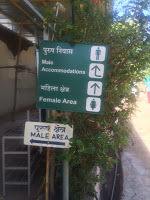
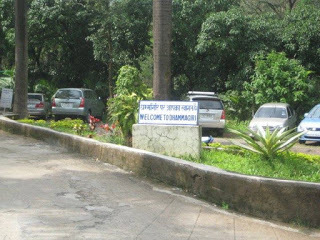
Day Zero – 08:00 PM – The male students were separated from the female and the Noble Silence began. Noble silence means no communication of any form with any being, eye contact included. The next 10 days I would walk with my head pointing the path a few feet ahead of me, careful not to meet even the eye of a fellow student.
After a quick set of instructions, we were asked to leave the hall and follow a Dhammasevak (volunteer) when my eyes fell on the time table hanging on the wall. If it hadn’t been for the Noble silence precinct I took a few moments back, I would have shrieked the hell out of my throat. A work schedule from 4:00 AM to 9.30 PM with only one item on the agenda. Mediation! And twelve hours of it everyday! But hadn’t I come there to learn just that? What else was I expecting on the agenda?
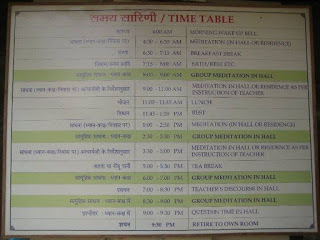 As night closed on Day Zero, I was introduced to my residential quarters. When they used that term in the initial briefing I was happy I would have a quarter all by myself. Well when I reached there it turned out to be a room of 3’ x 8’ if you excluded the stone platform for the mattress. It did have an attached bathroom but that was shared by a dozen insects of different shapes and sizes when I first walked in. To be to honest I didn’t know how potent they were if any one of them bit me, so I was careful not to deal with them unarmed atleast for the night. Another of the precincts was to abstain from killing so any battle with them was immediately ruled out. But how were we to co-exist in that environment was a big question to me.
As night closed on Day Zero, I was introduced to my residential quarters. When they used that term in the initial briefing I was happy I would have a quarter all by myself. Well when I reached there it turned out to be a room of 3’ x 8’ if you excluded the stone platform for the mattress. It did have an attached bathroom but that was shared by a dozen insects of different shapes and sizes when I first walked in. To be to honest I didn’t know how potent they were if any one of them bit me, so I was careful not to deal with them unarmed atleast for the night. Another of the precincts was to abstain from killing so any battle with them was immediately ruled out. But how were we to co-exist in that environment was a big question to me.
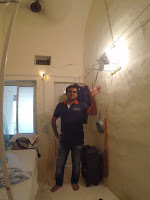 The rest of the room was OK as you can see. I put myself to sleep getting ready for my first experience with meditation at 4.00 AM the next morning. Three more precincts other than abstain from killing and the noble silence, namely – refrain from sexual pleasures, abstain from all intoxicants and no meals after noon. Not so hard, I convinced myself with an empty heart and moved on with the first two hours of meditation. It was then that I was introduced to Anapana. A form of meditation where one needed to observe one’s natural incoming and outgoing breath. That is all I needed to do, simple isn’t it? Breathe in, breathe out, naturally and observe it, breath after breath after breath, session after session after session, day after day after day. The only problem being my mind would not stay on it for more than a few breaths each time and disperse into long intervals of wandering away into glory. My teacher kept reassuring me it doesn’t matter. Whenever I realised the mind had wandered away, I must just get it back until it wandered again and without any anxiety or anger towards it. Do that as many times as required, I have no count but I guess my maximum span of concentration in the first hour was not more than 20 seconds at a time.
The rest of the room was OK as you can see. I put myself to sleep getting ready for my first experience with meditation at 4.00 AM the next morning. Three more precincts other than abstain from killing and the noble silence, namely – refrain from sexual pleasures, abstain from all intoxicants and no meals after noon. Not so hard, I convinced myself with an empty heart and moved on with the first two hours of meditation. It was then that I was introduced to Anapana. A form of meditation where one needed to observe one’s natural incoming and outgoing breath. That is all I needed to do, simple isn’t it? Breathe in, breathe out, naturally and observe it, breath after breath after breath, session after session after session, day after day after day. The only problem being my mind would not stay on it for more than a few breaths each time and disperse into long intervals of wandering away into glory. My teacher kept reassuring me it doesn’t matter. Whenever I realised the mind had wandered away, I must just get it back until it wandered again and without any anxiety or anger towards it. Do that as many times as required, I have no count but I guess my maximum span of concentration in the first hour was not more than 20 seconds at a time.
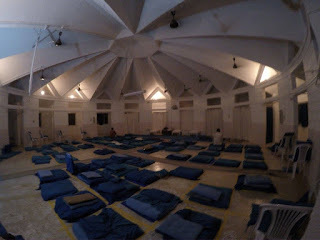
For the next three days I had observed approximately 50000 breaths and increased my span of attention from a minuscule 20 seconds to a miraculous 20 minutes. And I was proud of what I had achieved in the first two days here. I realised this was going to be tough and the reasons like no communication, no high luxuries, no dinner or average meals which I had thought would be the things that would irk me were infact the ones which actually got me glued to the only agenda there. Observation of my breath. The real problem still was putting your mind together for 12 hours a day with an erect back posture and patiently bringing the fickle mind back to observing the breathing again and again and again and without getting irritated one bit, with absolute equanimity and awareness. It indeed was hard work. I took one more prescient other than the five they gave me. I surrendered to what they asked of me without questioning them for the next 10 days! And trust me that was the only thing that got me through.
The precincts which looked like hurdles thrown in my pathway turned out to be the real reason why I was able to dedicate my heart and mind to process consistently and continuously. It was three days now and I had hardly seen anybody in the eye, the reason why my mind was able to be more focused on the task than thinking of what someone else was doing. I hadn’t spoken, so I had less to think about and lying was out of question.
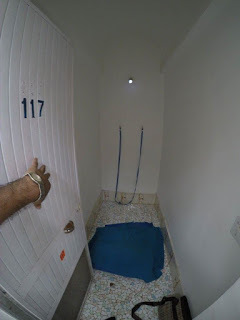 Come end of day two and the focus moved from observing our breath to observing the sensations around the nasal passage. I realised they had got our attention span to about 30 minutes a time and now wanted to sharpen our focus and therefore a small portion of the nose was given to concentrate. For the next two days, all I did was concentrate on my nasal area. Trust me it was on fire, I got all kinds of twitching, soreness, throbbing, palpations, tingling and several other sensations continuously. I didn’t know what was happening and why. My area above my top lip felt as big as a football field in my mind and all kinds of games were being played on it. In the evening before retiring I would look at my nose and lip in the small mirror I carried from home and would be happy it hadn’t burnt off yet.
Come end of day two and the focus moved from observing our breath to observing the sensations around the nasal passage. I realised they had got our attention span to about 30 minutes a time and now wanted to sharpen our focus and therefore a small portion of the nose was given to concentrate. For the next two days, all I did was concentrate on my nasal area. Trust me it was on fire, I got all kinds of twitching, soreness, throbbing, palpations, tingling and several other sensations continuously. I didn’t know what was happening and why. My area above my top lip felt as big as a football field in my mind and all kinds of games were being played on it. In the evening before retiring I would look at my nose and lip in the small mirror I carried from home and would be happy it hadn’t burnt off yet.
Then came on the timetable of day 4. It read that we were ready to learn Vipassana Meditation today! What was I doing for 4 days then? I started wondering. Actually these exercises were a pre-requisite for the Vipassana Meditation technique they would teach us on day 4. Increasing the span of attention and developing the sharpness of the mind of focus on small regions was the pre-requisite for learning Vipassana, and the training did well. I didn’t know how that would help me, but I was thoroughly impressed with their teaching methods. They had certainly mastered that. Everything went like clock work and with the highest discipline.
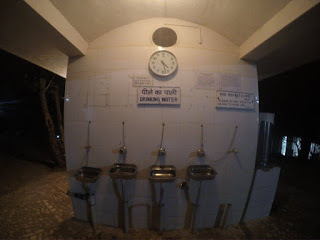 So what was the deal here? We always believe that the world around us causes us the pain or pleasure we experience and therefore is the reason for all our feelings. The reality is actually the inverse. It is we who feel that way about a certain person or experience. If we feel one person is bad, the fact is he is bad for us and not universally bad. Isn’t it true? And yet we feel the person is bad. What is the reason for our feelings?
So what was the deal here? We always believe that the world around us causes us the pain or pleasure we experience and therefore is the reason for all our feelings. The reality is actually the inverse. It is we who feel that way about a certain person or experience. If we feel one person is bad, the fact is he is bad for us and not universally bad. Isn’t it true? And yet we feel the person is bad. What is the reason for our feelings?
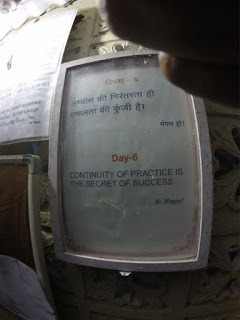 We find faults in situations when they are not to our liking and also blame them for what we feel about them. Also, we always look outside of us and constantly try to mend situations so they can comfort us. We look at people and places around us to seek peace and comfort. And it ofcourse never works and thus we are in peril and pain all the time. According to the Buddha, peace is within us and nobody can give it for us, we have to seek it for ourselves. Every person has a Buddha inside him. Vipassana is an art to experience and bring out that Buddha in us. But we have to work very hard to look for it inside us and then to bring it up. Buddha by definition is a state of the mind and that state of the mind is inside the mind, all life I had been looking outside myself for that peace which rested in me all along. This is a universal truth. I was about to experience a flicker of it, and trust me even a flicker is enough for a start.
We find faults in situations when they are not to our liking and also blame them for what we feel about them. Also, we always look outside of us and constantly try to mend situations so they can comfort us. We look at people and places around us to seek peace and comfort. And it ofcourse never works and thus we are in peril and pain all the time. According to the Buddha, peace is within us and nobody can give it for us, we have to seek it for ourselves. Every person has a Buddha inside him. Vipassana is an art to experience and bring out that Buddha in us. But we have to work very hard to look for it inside us and then to bring it up. Buddha by definition is a state of the mind and that state of the mind is inside the mind, all life I had been looking outside myself for that peace which rested in me all along. This is a universal truth. I was about to experience a flicker of it, and trust me even a flicker is enough for a start.
 The mind is constantly bombarded with information received through the five senses – smell, taste, touch, hearing & sight. The sixth sense which is the conscious mind also contributes to this information system with its memories and interpretations based on our past experiences. The perception system of the mind tries to make inferences based on its mental habits in the form of signals. All life we have been receiving information and reacting to it based on our interpretation. The deep sub-conscious mind which we cannot interact with stores these in the form of sensations and it only understands sensations. This part of the mind does not behave at our will. We all have heart beats which are controlled by a part of the subconscious mind, even when we are sleeping the heart still beats, the lungs still functions and so does the kidney and several other organs of the body.
The mind is constantly bombarded with information received through the five senses – smell, taste, touch, hearing & sight. The sixth sense which is the conscious mind also contributes to this information system with its memories and interpretations based on our past experiences. The perception system of the mind tries to make inferences based on its mental habits in the form of signals. All life we have been receiving information and reacting to it based on our interpretation. The deep sub-conscious mind which we cannot interact with stores these in the form of sensations and it only understands sensations. This part of the mind does not behave at our will. We all have heart beats which are controlled by a part of the subconscious mind, even when we are sleeping the heart still beats, the lungs still functions and so does the kidney and several other organs of the body.
We do not have to give it instructions, they are coded in the sub-conscious mind. This sub-conscious mind is still a mind and this part of the mind only reacts to sensations. Sensations which are formed based on the interpretations made by the mind and influenced by the senses. If the perception is pleasant the sensations are pleasant and the mind wants more of them, likewise what it senses is unpleasant the mind repulses it and forms an aversion to such sensations. Over time the sub-conscious mind becomes a databank of sensations trying to revolt to anything unpleasant and wanting more of the pleasant ones.
Here are a few examples. A smoker gets pleasant sensations when he smokes, the deep mind therefore wants more of it irrespective of whether it is good or bad. Likewise, if it senses any pain it wants to dispel it and would want no more of it. It is these interpretations which makes our sub-conscious mind to react. The reactions we call anger, love, hate, aversion, pleasure and so on and so forth are all nothing but sensations and more importantly temporary. If we do not feed them with reactions, they will cease to exist. The habit pattern of the mind starts to break. Vipassana is a technique to identify these sensations inside us and also if we see them emerge with the awareness that these sensations are only temporary and have no lasting power we are able to overpower them and act with awareness and equanimity instead of reacting like we normally do.
Take the example of an angry mind. Buddha would never act with aversion to somebody who hurled anger at him. The reason is that for anger to generate in one’s mind and show itself in the form of physical reactions, the angered the person has to be in deep pain. A Buddha knows that before demonstrating that pain on the physical self, that person must pass through a lot of pain himself. How can someone who knows this process get angry on someone who is acting because of his misery? The only feeling that can come for such a person is that of compassion. A compassion generated out of the knowledge that the person who is actually abusing you is really in misery and pain himself. He ofcourse has no power to give that pain to you because your senses will not generate aversion in your mind and he has no capacity to influence your actions.
Sounds complicated still? Well it is atleast to explain. But one has to experience how the mind works from the process of physical senses sending information to the mind, the physical mind then making interpretations based on his memory of such instances. The sub-conscious mind sending out sensations back to the physical mind and the physical mind then reacting to these sensations on the habit patterns of the mind. Buddha understood the link that must be broken is the reaction to these sensations. If the mind does not react to these sensations of pleasure and pain it will simply stop to influence your reaction. The reaction will then become an action and one that is taken with full awareness. And anger has no place in a mind which is aware, and without awareness you are not in control of your mind. Vipassana teaches you just that and well.
Over the next five days, I practiced Vipassana and every moment I could feel sensations emerge on every part of my body inside and outside, the more I practiced it the more aware I became of these sensations, which appeared and disappeared continually. Keeping the equanimity of the mind, I realized if I did not react to these sensations they simply disappeared. How much time I wasted reacting and feeding sensations which really were temporary in nature and meant to be cease in time. That is their nature. We are slaves of situations when we can control the motions of the mind simply by being aware that the mind is so jittery and a bundle of senseless reactions which serve no purpose.
Over the next five days, my mind calmed and cooled down and hardly reacted to anything around me. Standing in a queue patiently, eating whatever food was served to me, sleeping without a fan, sitting still for an hour at a time, being satisfied with only one meal a day and so many other so called inconveniences in daily life seemed so much more acceptable and without any aversion and mindless agitation towards them. I began to understand the real meaning of being at peace with oneself.
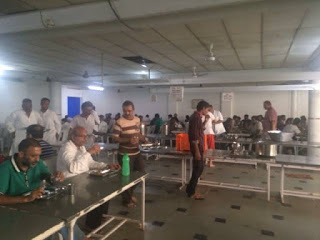 Then came day 10. The morning we ended the noble silence. For the first time I spoke to the fellow students. The day left me spell bound. I was overwhelmed simply talking to people around me and also spoke to my friends and family back home. The sky was over me for the past 10 days so I knew hell didn’t break loose. But I wasn’t sure if there was an earthquake in some part of the world and even if my near and dear ones were fine. Fortunately, all was OK. But it ended a lot of anxiety in me. I met one French man whom I had observed for the past so many days. I happened to ask him about his experience and his profession. He told me he was a beggar. I was spell bound. I did not know there was a profession like that and someone could say that with so much equanimity and yet I felt no sorrow or aversion towards him. Similarly, I met another fellow who had done some 40 sessions of 10 days each and I was shocked to know he was a disk jockey. I didn’t know how a person with a profession full of noise and vices around it could practice this art and stay calm and aware all the time. He spoke to me for about an hour telling me about his experience through this journey. I was convinced one’s profession had nothing to do with behaving rationally in life.
Then came day 10. The morning we ended the noble silence. For the first time I spoke to the fellow students. The day left me spell bound. I was overwhelmed simply talking to people around me and also spoke to my friends and family back home. The sky was over me for the past 10 days so I knew hell didn’t break loose. But I wasn’t sure if there was an earthquake in some part of the world and even if my near and dear ones were fine. Fortunately, all was OK. But it ended a lot of anxiety in me. I met one French man whom I had observed for the past so many days. I happened to ask him about his experience and his profession. He told me he was a beggar. I was spell bound. I did not know there was a profession like that and someone could say that with so much equanimity and yet I felt no sorrow or aversion towards him. Similarly, I met another fellow who had done some 40 sessions of 10 days each and I was shocked to know he was a disk jockey. I didn’t know how a person with a profession full of noise and vices around it could practice this art and stay calm and aware all the time. He spoke to me for about an hour telling me about his experience through this journey. I was convinced one’s profession had nothing to do with behaving rationally in life.
I used to see one aged man trudging everyday back and forth from the hall to his room every day and relentlessly. He used to meditate in a chair arranged for him and I paid my respect to him with folded hands for his energy and determination inspite of his failing health. To my shock I learnt he was the father of our teacher and was practicing Vipassana influenced by his son for the past few years. His son Anand who was my teacher was a successful engineer in Germany came across the Dhamma of Vipassana during his time in Germany. He met his better half, an American from California where the couple gave up their professional life and now taught the practice of Vipassana to students like us at Igatpuri.
There is so much pain around the world. Pain caused by our thoughts and its senseless reactions. Each one of us are born and simply racing to our death from that very moment. Little do we realise that all we do during our entire life is feed our cravings and senseless ambitions when the fact is we are all born to die. We cannot change any of it. All we can do is live in the now with the awareness that life is only a journey. However difficult it may be to come to realisation of this fact, it still is a fact. Funny, we have seen it for eons now, and yet it is so difficult to accept it. Today humans are looking for intelligence in Mars when we fail to see even a drop of intelligence inside it. The fact is we embody an ocean of wisdom within us and finding a drop becomes so difficult. And even if we find that drop recognising it becomes so impossible. We all know the truth, but we all will fight it relentlessly and needlessly. Man kills man and without a thought, he gives pain only to get more pain in return. With anger we disturb our conscience, senselessly distribute this anxiety around us and mutate the peace of the friends, family and the world around us. What do we gain from it other than generating pain for ourselves and our near and dear ones? All life we are craving for the ‘I’ or the ‘my’. This ‘I’ only generates ego and the ‘my’ which is the so called physical possessions fires that ego all our life. At the end of the day mortality will part this ‘I’ from the ‘my’ and they will both remain here and serve no purpose. It is a universal ‘cause’ and ‘effect’. Birth causes death and that death causes a new birth. This is the only cyclical religion of the world which too is universal, and this is the only truth. Religion cannot be different for different living forms. Like humans are a universal species, so is its religion. The religion of awareness, truth and the cycle of birth and death.
I am not sure Vipassana can make a Buddha, but I know even if I am able to tame the ego of the ‘I’ in me or the craving for what ever I call ‘my’ by an ounce, it will be a life well lived with satisfaction and peace. The more I move towards that path, the more it will allow me to come to terms with the universal law of impermanence. Nothing is permanent – You, me and everyone is on a journey here, and we have two choices, either live that journey with awareness and compassion or race to our death seeking something that does not exist, and certainly not in the material possessions outside our mind. I read a book years ago ‘If you meet the Buddha on the road, kill him’. I understood the meaning of that book after I spent 10 days at Igatpuri.
Ignorance is bliss, or atleast it was when I stepped into the premises of the Vipassana Meditation Center at Igatpuri with a total prior meditation experience of a few minutes in my life of 39 years.


Day Zero – 08:00 PM – The male students were separated from the female and the Noble Silence began. Noble silence means no communication of any form with any being, eye contact included. The next 10 days I would walk with my head pointing the path a few feet ahead of me, careful not to meet even the eye of a fellow student.
After a quick set of instructions, we were asked to leave the hall and follow a Dhammasevak (volunteer) when my eyes fell on the time table hanging on the wall. If it hadn’t been for the Noble silence precinct I took a few moments back, I would have shrieked the hell out of my throat. A work schedule from 4:00 AM to 9.30 PM with only one item on the agenda. Mediation! And twelve hours of it everyday! But hadn’t I come there to learn just that? What else was I expecting on the agenda?
 As night closed on Day Zero, I was introduced to my residential quarters. When they used that term in the initial briefing I was happy I would have a quarter all by myself. Well when I reached there it turned out to be a room of 3’ x 8’ if you excluded the stone platform for the mattress. It did have an attached bathroom but that was shared by a dozen insects of different shapes and sizes when I first walked in. To be to honest I didn’t know how potent they were if any one of them bit me, so I was careful not to deal with them unarmed atleast for the night. Another of the precincts was to abstain from killing so any battle with them was immediately ruled out. But how were we to co-exist in that environment was a big question to me.
As night closed on Day Zero, I was introduced to my residential quarters. When they used that term in the initial briefing I was happy I would have a quarter all by myself. Well when I reached there it turned out to be a room of 3’ x 8’ if you excluded the stone platform for the mattress. It did have an attached bathroom but that was shared by a dozen insects of different shapes and sizes when I first walked in. To be to honest I didn’t know how potent they were if any one of them bit me, so I was careful not to deal with them unarmed atleast for the night. Another of the precincts was to abstain from killing so any battle with them was immediately ruled out. But how were we to co-exist in that environment was a big question to me.  The rest of the room was OK as you can see. I put myself to sleep getting ready for my first experience with meditation at 4.00 AM the next morning. Three more precincts other than abstain from killing and the noble silence, namely – refrain from sexual pleasures, abstain from all intoxicants and no meals after noon. Not so hard, I convinced myself with an empty heart and moved on with the first two hours of meditation. It was then that I was introduced to Anapana. A form of meditation where one needed to observe one’s natural incoming and outgoing breath. That is all I needed to do, simple isn’t it? Breathe in, breathe out, naturally and observe it, breath after breath after breath, session after session after session, day after day after day. The only problem being my mind would not stay on it for more than a few breaths each time and disperse into long intervals of wandering away into glory. My teacher kept reassuring me it doesn’t matter. Whenever I realised the mind had wandered away, I must just get it back until it wandered again and without any anxiety or anger towards it. Do that as many times as required, I have no count but I guess my maximum span of concentration in the first hour was not more than 20 seconds at a time.
The rest of the room was OK as you can see. I put myself to sleep getting ready for my first experience with meditation at 4.00 AM the next morning. Three more precincts other than abstain from killing and the noble silence, namely – refrain from sexual pleasures, abstain from all intoxicants and no meals after noon. Not so hard, I convinced myself with an empty heart and moved on with the first two hours of meditation. It was then that I was introduced to Anapana. A form of meditation where one needed to observe one’s natural incoming and outgoing breath. That is all I needed to do, simple isn’t it? Breathe in, breathe out, naturally and observe it, breath after breath after breath, session after session after session, day after day after day. The only problem being my mind would not stay on it for more than a few breaths each time and disperse into long intervals of wandering away into glory. My teacher kept reassuring me it doesn’t matter. Whenever I realised the mind had wandered away, I must just get it back until it wandered again and without any anxiety or anger towards it. Do that as many times as required, I have no count but I guess my maximum span of concentration in the first hour was not more than 20 seconds at a time.

For the next three days I had observed approximately 50000 breaths and increased my span of attention from a minuscule 20 seconds to a miraculous 20 minutes. And I was proud of what I had achieved in the first two days here. I realised this was going to be tough and the reasons like no communication, no high luxuries, no dinner or average meals which I had thought would be the things that would irk me were infact the ones which actually got me glued to the only agenda there. Observation of my breath. The real problem still was putting your mind together for 12 hours a day with an erect back posture and patiently bringing the fickle mind back to observing the breathing again and again and again and without getting irritated one bit, with absolute equanimity and awareness. It indeed was hard work. I took one more prescient other than the five they gave me. I surrendered to what they asked of me without questioning them for the next 10 days! And trust me that was the only thing that got me through.
The precincts which looked like hurdles thrown in my pathway turned out to be the real reason why I was able to dedicate my heart and mind to process consistently and continuously. It was three days now and I had hardly seen anybody in the eye, the reason why my mind was able to be more focused on the task than thinking of what someone else was doing. I hadn’t spoken, so I had less to think about and lying was out of question.
 Come end of day two and the focus moved from observing our breath to observing the sensations around the nasal passage. I realised they had got our attention span to about 30 minutes a time and now wanted to sharpen our focus and therefore a small portion of the nose was given to concentrate. For the next two days, all I did was concentrate on my nasal area. Trust me it was on fire, I got all kinds of twitching, soreness, throbbing, palpations, tingling and several other sensations continuously. I didn’t know what was happening and why. My area above my top lip felt as big as a football field in my mind and all kinds of games were being played on it. In the evening before retiring I would look at my nose and lip in the small mirror I carried from home and would be happy it hadn’t burnt off yet.
Come end of day two and the focus moved from observing our breath to observing the sensations around the nasal passage. I realised they had got our attention span to about 30 minutes a time and now wanted to sharpen our focus and therefore a small portion of the nose was given to concentrate. For the next two days, all I did was concentrate on my nasal area. Trust me it was on fire, I got all kinds of twitching, soreness, throbbing, palpations, tingling and several other sensations continuously. I didn’t know what was happening and why. My area above my top lip felt as big as a football field in my mind and all kinds of games were being played on it. In the evening before retiring I would look at my nose and lip in the small mirror I carried from home and would be happy it hadn’t burnt off yet. Then came on the timetable of day 4. It read that we were ready to learn Vipassana Meditation today! What was I doing for 4 days then? I started wondering. Actually these exercises were a pre-requisite for the Vipassana Meditation technique they would teach us on day 4. Increasing the span of attention and developing the sharpness of the mind of focus on small regions was the pre-requisite for learning Vipassana, and the training did well. I didn’t know how that would help me, but I was thoroughly impressed with their teaching methods. They had certainly mastered that. Everything went like clock work and with the highest discipline.
 So what was the deal here? We always believe that the world around us causes us the pain or pleasure we experience and therefore is the reason for all our feelings. The reality is actually the inverse. It is we who feel that way about a certain person or experience. If we feel one person is bad, the fact is he is bad for us and not universally bad. Isn’t it true? And yet we feel the person is bad. What is the reason for our feelings?
So what was the deal here? We always believe that the world around us causes us the pain or pleasure we experience and therefore is the reason for all our feelings. The reality is actually the inverse. It is we who feel that way about a certain person or experience. If we feel one person is bad, the fact is he is bad for us and not universally bad. Isn’t it true? And yet we feel the person is bad. What is the reason for our feelings? We find faults in situations when they are not to our liking and also blame them for what we feel about them. Also, we always look outside of us and constantly try to mend situations so they can comfort us. We look at people and places around us to seek peace and comfort. And it ofcourse never works and thus we are in peril and pain all the time. According to the Buddha, peace is within us and nobody can give it for us, we have to seek it for ourselves. Every person has a Buddha inside him. Vipassana is an art to experience and bring out that Buddha in us. But we have to work very hard to look for it inside us and then to bring it up. Buddha by definition is a state of the mind and that state of the mind is inside the mind, all life I had been looking outside myself for that peace which rested in me all along. This is a universal truth. I was about to experience a flicker of it, and trust me even a flicker is enough for a start.
We find faults in situations when they are not to our liking and also blame them for what we feel about them. Also, we always look outside of us and constantly try to mend situations so they can comfort us. We look at people and places around us to seek peace and comfort. And it ofcourse never works and thus we are in peril and pain all the time. According to the Buddha, peace is within us and nobody can give it for us, we have to seek it for ourselves. Every person has a Buddha inside him. Vipassana is an art to experience and bring out that Buddha in us. But we have to work very hard to look for it inside us and then to bring it up. Buddha by definition is a state of the mind and that state of the mind is inside the mind, all life I had been looking outside myself for that peace which rested in me all along. This is a universal truth. I was about to experience a flicker of it, and trust me even a flicker is enough for a start.
 The mind is constantly bombarded with information received through the five senses – smell, taste, touch, hearing & sight. The sixth sense which is the conscious mind also contributes to this information system with its memories and interpretations based on our past experiences. The perception system of the mind tries to make inferences based on its mental habits in the form of signals. All life we have been receiving information and reacting to it based on our interpretation. The deep sub-conscious mind which we cannot interact with stores these in the form of sensations and it only understands sensations. This part of the mind does not behave at our will. We all have heart beats which are controlled by a part of the subconscious mind, even when we are sleeping the heart still beats, the lungs still functions and so does the kidney and several other organs of the body.
The mind is constantly bombarded with information received through the five senses – smell, taste, touch, hearing & sight. The sixth sense which is the conscious mind also contributes to this information system with its memories and interpretations based on our past experiences. The perception system of the mind tries to make inferences based on its mental habits in the form of signals. All life we have been receiving information and reacting to it based on our interpretation. The deep sub-conscious mind which we cannot interact with stores these in the form of sensations and it only understands sensations. This part of the mind does not behave at our will. We all have heart beats which are controlled by a part of the subconscious mind, even when we are sleeping the heart still beats, the lungs still functions and so does the kidney and several other organs of the body. We do not have to give it instructions, they are coded in the sub-conscious mind. This sub-conscious mind is still a mind and this part of the mind only reacts to sensations. Sensations which are formed based on the interpretations made by the mind and influenced by the senses. If the perception is pleasant the sensations are pleasant and the mind wants more of them, likewise what it senses is unpleasant the mind repulses it and forms an aversion to such sensations. Over time the sub-conscious mind becomes a databank of sensations trying to revolt to anything unpleasant and wanting more of the pleasant ones.
Here are a few examples. A smoker gets pleasant sensations when he smokes, the deep mind therefore wants more of it irrespective of whether it is good or bad. Likewise, if it senses any pain it wants to dispel it and would want no more of it. It is these interpretations which makes our sub-conscious mind to react. The reactions we call anger, love, hate, aversion, pleasure and so on and so forth are all nothing but sensations and more importantly temporary. If we do not feed them with reactions, they will cease to exist. The habit pattern of the mind starts to break. Vipassana is a technique to identify these sensations inside us and also if we see them emerge with the awareness that these sensations are only temporary and have no lasting power we are able to overpower them and act with awareness and equanimity instead of reacting like we normally do.
Take the example of an angry mind. Buddha would never act with aversion to somebody who hurled anger at him. The reason is that for anger to generate in one’s mind and show itself in the form of physical reactions, the angered the person has to be in deep pain. A Buddha knows that before demonstrating that pain on the physical self, that person must pass through a lot of pain himself. How can someone who knows this process get angry on someone who is acting because of his misery? The only feeling that can come for such a person is that of compassion. A compassion generated out of the knowledge that the person who is actually abusing you is really in misery and pain himself. He ofcourse has no power to give that pain to you because your senses will not generate aversion in your mind and he has no capacity to influence your actions.
Sounds complicated still? Well it is atleast to explain. But one has to experience how the mind works from the process of physical senses sending information to the mind, the physical mind then making interpretations based on his memory of such instances. The sub-conscious mind sending out sensations back to the physical mind and the physical mind then reacting to these sensations on the habit patterns of the mind. Buddha understood the link that must be broken is the reaction to these sensations. If the mind does not react to these sensations of pleasure and pain it will simply stop to influence your reaction. The reaction will then become an action and one that is taken with full awareness. And anger has no place in a mind which is aware, and without awareness you are not in control of your mind. Vipassana teaches you just that and well.
Over the next five days, I practiced Vipassana and every moment I could feel sensations emerge on every part of my body inside and outside, the more I practiced it the more aware I became of these sensations, which appeared and disappeared continually. Keeping the equanimity of the mind, I realized if I did not react to these sensations they simply disappeared. How much time I wasted reacting and feeding sensations which really were temporary in nature and meant to be cease in time. That is their nature. We are slaves of situations when we can control the motions of the mind simply by being aware that the mind is so jittery and a bundle of senseless reactions which serve no purpose.
Over the next five days, my mind calmed and cooled down and hardly reacted to anything around me. Standing in a queue patiently, eating whatever food was served to me, sleeping without a fan, sitting still for an hour at a time, being satisfied with only one meal a day and so many other so called inconveniences in daily life seemed so much more acceptable and without any aversion and mindless agitation towards them. I began to understand the real meaning of being at peace with oneself.
 Then came day 10. The morning we ended the noble silence. For the first time I spoke to the fellow students. The day left me spell bound. I was overwhelmed simply talking to people around me and also spoke to my friends and family back home. The sky was over me for the past 10 days so I knew hell didn’t break loose. But I wasn’t sure if there was an earthquake in some part of the world and even if my near and dear ones were fine. Fortunately, all was OK. But it ended a lot of anxiety in me. I met one French man whom I had observed for the past so many days. I happened to ask him about his experience and his profession. He told me he was a beggar. I was spell bound. I did not know there was a profession like that and someone could say that with so much equanimity and yet I felt no sorrow or aversion towards him. Similarly, I met another fellow who had done some 40 sessions of 10 days each and I was shocked to know he was a disk jockey. I didn’t know how a person with a profession full of noise and vices around it could practice this art and stay calm and aware all the time. He spoke to me for about an hour telling me about his experience through this journey. I was convinced one’s profession had nothing to do with behaving rationally in life.
Then came day 10. The morning we ended the noble silence. For the first time I spoke to the fellow students. The day left me spell bound. I was overwhelmed simply talking to people around me and also spoke to my friends and family back home. The sky was over me for the past 10 days so I knew hell didn’t break loose. But I wasn’t sure if there was an earthquake in some part of the world and even if my near and dear ones were fine. Fortunately, all was OK. But it ended a lot of anxiety in me. I met one French man whom I had observed for the past so many days. I happened to ask him about his experience and his profession. He told me he was a beggar. I was spell bound. I did not know there was a profession like that and someone could say that with so much equanimity and yet I felt no sorrow or aversion towards him. Similarly, I met another fellow who had done some 40 sessions of 10 days each and I was shocked to know he was a disk jockey. I didn’t know how a person with a profession full of noise and vices around it could practice this art and stay calm and aware all the time. He spoke to me for about an hour telling me about his experience through this journey. I was convinced one’s profession had nothing to do with behaving rationally in life. I used to see one aged man trudging everyday back and forth from the hall to his room every day and relentlessly. He used to meditate in a chair arranged for him and I paid my respect to him with folded hands for his energy and determination inspite of his failing health. To my shock I learnt he was the father of our teacher and was practicing Vipassana influenced by his son for the past few years. His son Anand who was my teacher was a successful engineer in Germany came across the Dhamma of Vipassana during his time in Germany. He met his better half, an American from California where the couple gave up their professional life and now taught the practice of Vipassana to students like us at Igatpuri.
There is so much pain around the world. Pain caused by our thoughts and its senseless reactions. Each one of us are born and simply racing to our death from that very moment. Little do we realise that all we do during our entire life is feed our cravings and senseless ambitions when the fact is we are all born to die. We cannot change any of it. All we can do is live in the now with the awareness that life is only a journey. However difficult it may be to come to realisation of this fact, it still is a fact. Funny, we have seen it for eons now, and yet it is so difficult to accept it. Today humans are looking for intelligence in Mars when we fail to see even a drop of intelligence inside it. The fact is we embody an ocean of wisdom within us and finding a drop becomes so difficult. And even if we find that drop recognising it becomes so impossible. We all know the truth, but we all will fight it relentlessly and needlessly. Man kills man and without a thought, he gives pain only to get more pain in return. With anger we disturb our conscience, senselessly distribute this anxiety around us and mutate the peace of the friends, family and the world around us. What do we gain from it other than generating pain for ourselves and our near and dear ones? All life we are craving for the ‘I’ or the ‘my’. This ‘I’ only generates ego and the ‘my’ which is the so called physical possessions fires that ego all our life. At the end of the day mortality will part this ‘I’ from the ‘my’ and they will both remain here and serve no purpose. It is a universal ‘cause’ and ‘effect’. Birth causes death and that death causes a new birth. This is the only cyclical religion of the world which too is universal, and this is the only truth. Religion cannot be different for different living forms. Like humans are a universal species, so is its religion. The religion of awareness, truth and the cycle of birth and death.
I am not sure Vipassana can make a Buddha, but I know even if I am able to tame the ego of the ‘I’ in me or the craving for what ever I call ‘my’ by an ounce, it will be a life well lived with satisfaction and peace. The more I move towards that path, the more it will allow me to come to terms with the universal law of impermanence. Nothing is permanent – You, me and everyone is on a journey here, and we have two choices, either live that journey with awareness and compassion or race to our death seeking something that does not exist, and certainly not in the material possessions outside our mind. I read a book years ago ‘If you meet the Buddha on the road, kill him’. I understood the meaning of that book after I spent 10 days at Igatpuri.
Published on March 28, 2016 08:34
No comments have been added yet.



